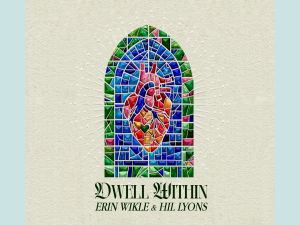Exploring a reel spirituality
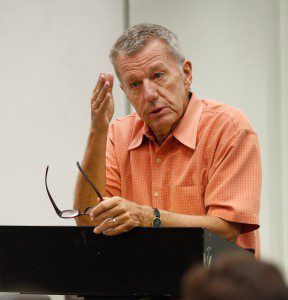 “If I am simply critical of the culture, the culture is going to be dismissive of me. If we’re going to be effective in our outreach and evangelism, and if we’re going to really know ourselves—because we’re a part of that same culture—we need to be able to engage the stories that are forming the metanarrative and way we understand life around us, and we need to then be able to put that in conversation with God’s story that can complete it.”
“If I am simply critical of the culture, the culture is going to be dismissive of me. If we’re going to be effective in our outreach and evangelism, and if we’re going to really know ourselves—because we’re a part of that same culture—we need to be able to engage the stories that are forming the metanarrative and way we understand life around us, and we need to then be able to put that in conversation with God’s story that can complete it.”
+ Robert Johnston, professor of theology and culture and founder of the Brehm Center’s Reel Spirituality initiative, on the importance of cultivating an open posture to culture. For nearly 15 years the Brehm Center’s Reel Spirituality initiative has been curating the conversation between film, faith, and culture. Screenings, panels, books, study guides, discussions, and filmmaking are part of ongoing life together. Read their extensive reviews and more. Watch more of Dr. Johnston’s reflections here. Pictured: a screening of Silence followed by a conversation with the filmmaker Martin Scorsese available here.
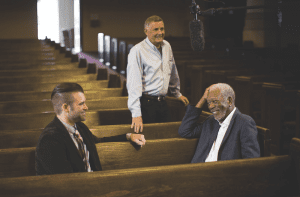 “One of the challenges for evangelical Christians is that we’re not very good at being conversationalists. We tend to speak before we listen, and when we do that, we’re not actually hearing what the culture is saying. If theology and the Christian faith is going to be intelligible or make sense to anyone in the modern world, it really has to come from a place of being conversant with culture.”
“One of the challenges for evangelical Christians is that we’re not very good at being conversationalists. We tend to speak before we listen, and when we do that, we’re not actually hearing what the culture is saying. If theology and the Christian faith is going to be intelligible or make sense to anyone in the modern world, it really has to come from a place of being conversant with culture.”
+ Kutter Callaway, professor of theology and culture, fromWatching TV Religiously: Television and Theology in Dialogue. Callaway is pictured here in conversation with actor Morgan Freeman, as part of a television series that aired earlier this year on the National Geographic Channel. Watch the episode here. Listen to Kutter and screenwriter Dean Batali discuss television and theology in their podcast Televisual Theology.
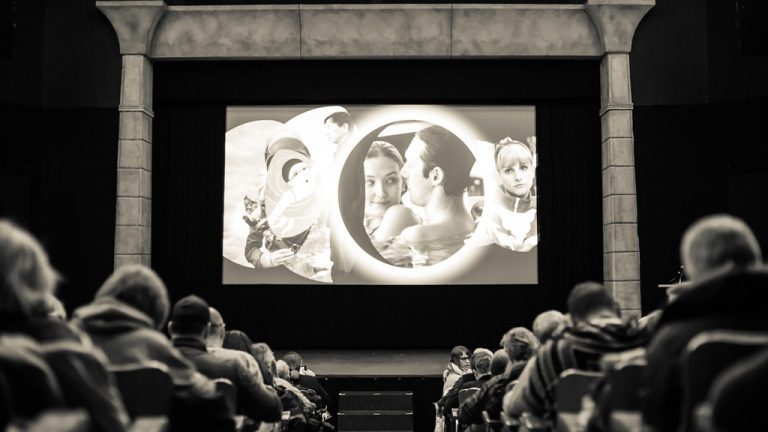 We all have cinematic blind spots, films we haven’t seen that are famous and that have influenced so much of the cinema we love. Reel Spirituality podcast regulars Matt Aughtry, A. C. Neel, Jonathan Stoner, and I decided to correct at least one of those blind spots together by focusing on the films of Andrei Tarkovsky. For several nights we watched his greatest films together. Discussing them afterwards was among the most enriching group movie-watching experiences of our lives.
We all have cinematic blind spots, films we haven’t seen that are famous and that have influenced so much of the cinema we love. Reel Spirituality podcast regulars Matt Aughtry, A. C. Neel, Jonathan Stoner, and I decided to correct at least one of those blind spots together by focusing on the films of Andrei Tarkovsky. For several nights we watched his greatest films together. Discussing them afterwards was among the most enriching group movie-watching experiences of our lives.
“I hope our podcasts inspire people to incorporate the communal into their movie watching and to take a chance on films that are outside their comfort zone. Art has the power to transform us when we interact with it communally and not just consumptively, when we commune with the artwork and with others in the process. We’re not made to be just consumers. We’re made to be communers with God, with others, and with the world.”
+ Elijah Davidson, co-director of Brehm Center’s Reel Spirituality initiative, reflecting on their living room film festivals and podcast. Pictured, a screening at the Brehm Center’s Sundance Film Festival immersion course.
“The notion that a film should be condemned for merely showing immoral behavior is, I hope, self-evidently problematic. Depiction does not mean endorsement. Great works of art engage the human condition with honesty and seriousness. This sometimes means taking an unflinching look at the darkest, ugliest parts of our existence. The fact that a work of art is about immorality does not make it an instance of immorality.”
+ Eugene Suen, co-director of Reel Spirituality and film producer, on the importance of being open to films that may not share our beliefs
The Power of Storytelling
“Tuning in to the truth of our own story can be daunting for any of us. Our first impulse is to deflect our stories, by saying they’re all too common, that no one would be interested. Why should anyone care? But, in fact, tuning in to your own story is your power. We are all unique. We have all faced difficult circumstances, experienced triumphs, setbacks, and disappointments. But it is how we have made our choices in the face of adversity—how we harnessed courage at our own thresholds—that makes each of us unique and exceptional. This is the story others want to hear. This is why you need to tell your story. And tell it well.”
+ Bobette Buster, story consultant and writer, spoke at the 2013 Brehm Lectures “Gospel and Narrative.” Hear her reflect on storytelling with other speakers on the Reel Spirituality Podcast.
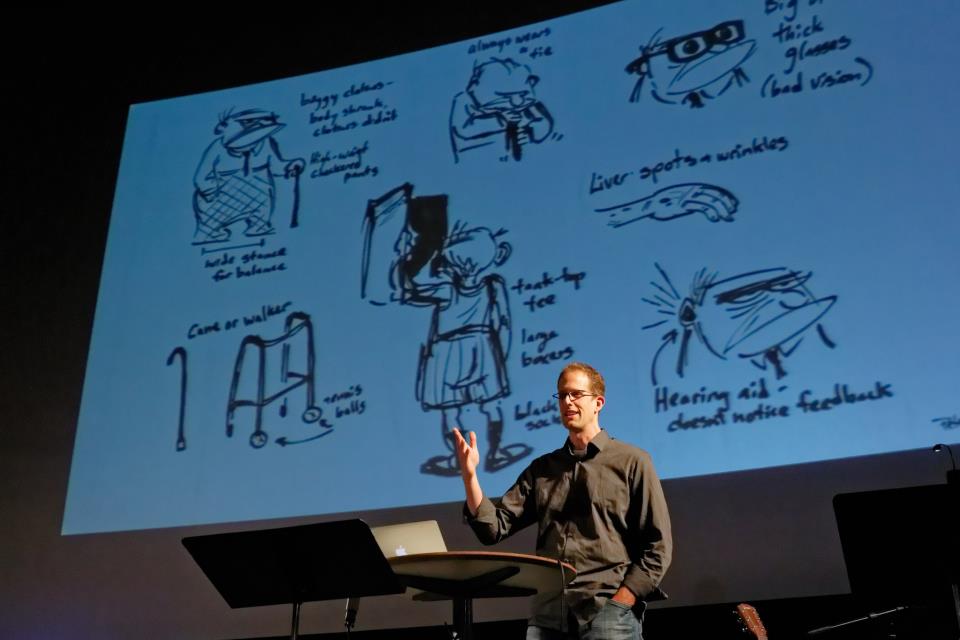 + Pixar’s Pete Docter, director of the animated film Up and Monsters, Inc, was a keynote speaker for “Preaching In A Visual Age,” a Brehm Center conference on preaching, film, and the visual arts. Read highlights from his interview below and watch more here.
+ Pixar’s Pete Docter, director of the animated film Up and Monsters, Inc, was a keynote speaker for “Preaching In A Visual Age,” a Brehm Center conference on preaching, film, and the visual arts. Read highlights from his interview below and watch more here.
Why do stories matter to human beings?
I think people are captivated by story because that’s the way we speak to one another. How many times have you sat bored in class or a church while the speaker shares factual information but as soon as they start saying, “You know, my sister-in-law got in an accident at the grocery store . . .” we immediately sit forward and feel connected. With stories, we become in tune with the experience they’re relating, and that is just hardwired into our brains.
What is the relationship between faith and stories?
Stories get to that connection that we all share between each other, between ourselves and our family, and between us and the Creator. I think Christianity as a religion recognizes the importance of that connection between people. At the heart of it, there’s still some mystery that only God knows. That is what stories can touch; when you have a really good story, it’s reaching for that unknown. This is what art does: it takes something beyond words—something that you can talk around but can’t quite grab onto with words—and speaks about that elusive nature of what it is to be human.
How should films tell the truth?
As we’re creating our films, we’re always looking for some sort of theme. It’s easy to think we’re looking for a moralistic message, but we don’t intend for it to be a lecture. Films are supposed to be a reflection on the world we see as people. Whether the characters are cars or monsters or insects, I’m always trying to find what it is about my life that if I saw it on the screen I’d recognize it like looking in a mirror. I see it and say, “That is truth. That is what life is about,” and I think that’s why people go to the movies. Obviously you go to be entertained, but the films that really stick with you are the ones that speak about what it is to be alive. That is what I’m looking for in the work I do.
Community Through Cinema
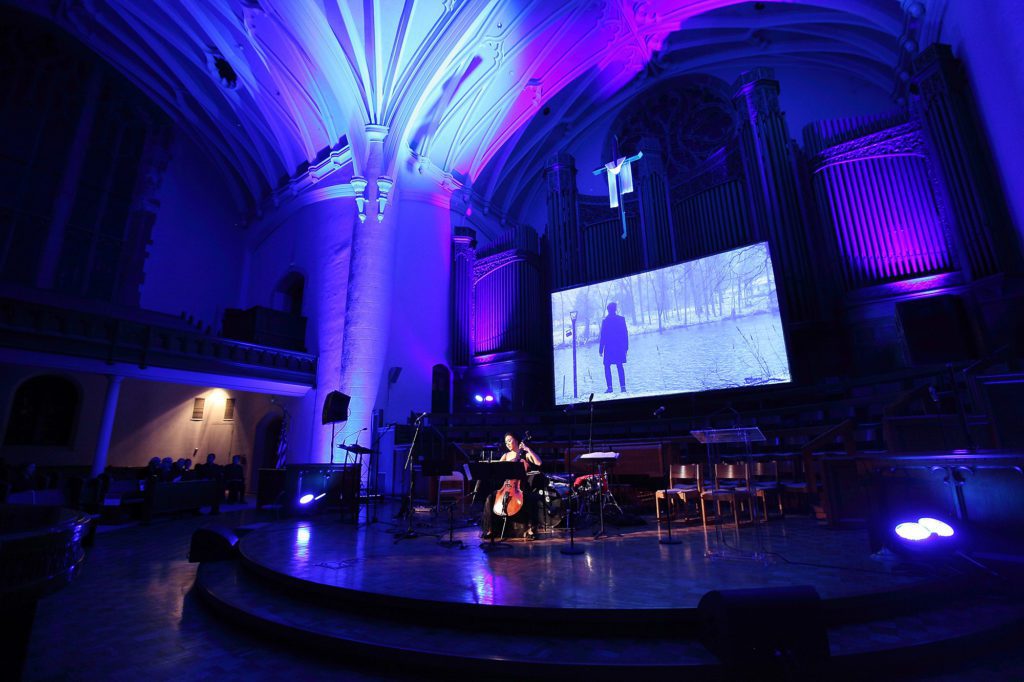
“Years ago I started as a filmmaker when the renaissance of independent film was in its infancy, accessible technology was just emerging as a viable alternative to celluloid, and the church still considered cinema the devil’s playground. It’s so rewarding to me that we have a legitimate filmmaking community here at Fuller that is as sophisticated as those found at actual film schools. We’re not just talking about movies over espresso drinks, we’re watching (and reading) Tarkovsky, discussing Soderbergh, watching Malick, and making our own films as we find our voices. I remember Rob Bethke, Justin Bell, Matt Webb, Camille Tucker, Drea Gacs, Dan Long, Eugene Suen, and many many others, as they started at Fuller, wondering if they had permission to merge twin callings to ministry and cinema. Now we have award-winning work coming from our community that is giving us exposure on filmmaker panels, juries, and festivals around the world. That means that the conversation that’s happening in our ad hoc independent film community here is cycling out into the wider world where we can inform and be informed. A dream come true.”
+ Lauralee Farrer, Fuller’s Chief Creative and film director. Learn more about her work at her film company Burning Heart Productions. When Mark Labberton was named the fifth president of Fuller, he asked Chief Creative Lauralee Farrer, then artist in residence at Fuller’s Brehm Center for Worship, Theology, and the Arts, to screen a portion of Praying the Hours on the eve of his inauguration ceremony. On this momentous occasion for Fuller, an evening of film and prayer and music and spoken liturgy gave a fresh view on the ancient discipline of the hours of prayer, ushering the audience into thoughtful worship together. The nearly 1,000 attendees heard many voices—most of whom were part of the Fuller community of students, alumni, staff, faculty, and administrators who read from Scripture, recited contemporary poems, and spoke prayers both ancient and new. The unconventional liturgy that was intermingled throughout the service led to the focal point of the film screening. It was evidence of the new administration’s commitment to an abundant reception to the arts.
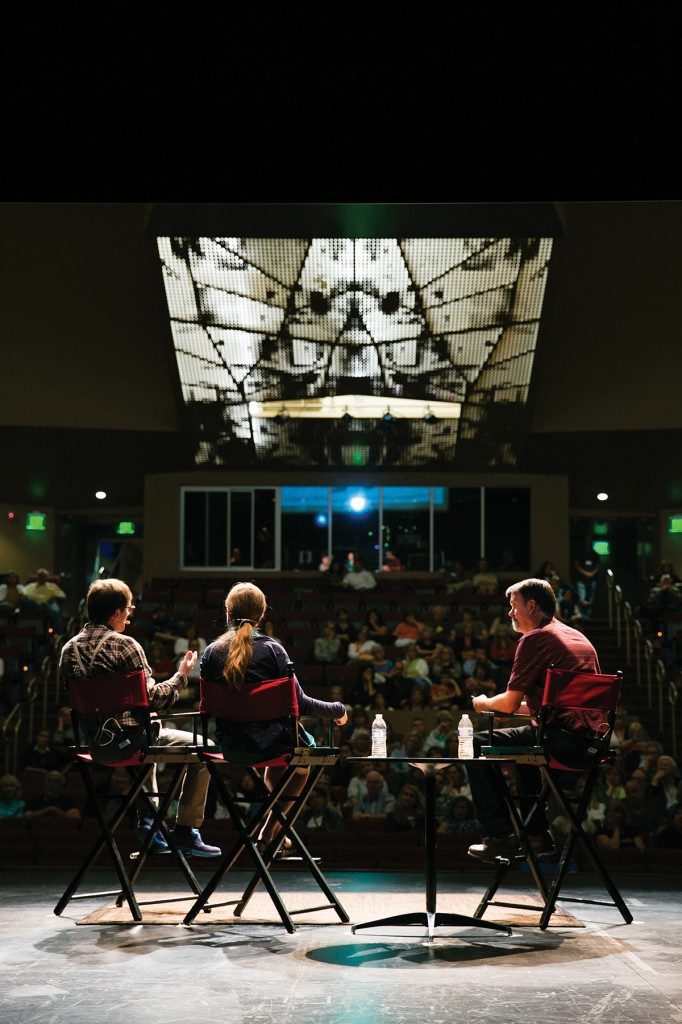 “There are always films with broad issues of spirituality, justice, and forgiveness for us to see and talk about as a community. The value of watching films together is that it creates an opportunity for hospitality to the filmmakers and the chance for us to find common ground through stories.”
“There are always films with broad issues of spirituality, justice, and forgiveness for us to see and talk about as a community. The value of watching films together is that it creates an opportunity for hospitality to the filmmakers and the chance for us to find common ground through stories.”
+ Will Stoller Lee (far right), the director of Fuller Colorado, hosts a question and answer panel with filmmakers James Duff and Julia Morrison of Hank and Asha, screened as part of the Windrider Bay Area film festival.
“Although it’s never explicitly called a “communal calling,” everything about [Lars and the Real Girl] looks and feels as though it is. The mystics have told us, “Love is what stitches us together.” The people of Lars’s church community (from the young to the elderly) end up doing simply this. And what’s great here is that it doesn’t just end up being about them upholding Lars’s delusion but, rather, about providing Lars the space to deal with his own past, his own pain over the death of a loved one he lost long ago. Thus, the film shows how a community’s adherence to its calling can often be the difference between saving and losing the human family.”
+ Neville Kiser (MAT’ 09), screenwriter, reflecting on one of the many Reel Spirituality screenings at Fuller Pasadena
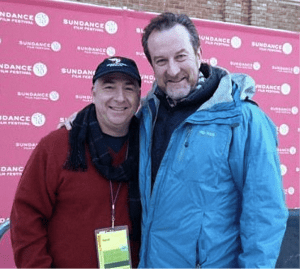 “Stories are truly the ‘storehouses’ of culture, and film—our culture’s principal form of storytelling—is the most critical, value-defining medium of our age. The name ‘windrider’ means ‘to ride the Ruach,’ the Hebrew term for the creative Spirit that hovered over the earth at creation and, we believe, continues to move in the hearts and minds of artists and their audiences today.”
“Stories are truly the ‘storehouses’ of culture, and film—our culture’s principal form of storytelling—is the most critical, value-defining medium of our age. The name ‘windrider’ means ‘to ride the Ruach,’ the Hebrew term for the creative Spirit that hovered over the earth at creation and, we believe, continues to move in the hearts and minds of artists and their audiences today.”
+ John Priddy (MAGL ’05), founder of the Windrider Forum and Ralph Winter, filmmaker and adjunct professor, at the Sundance Film Festival immersion course.
 “The art and beauty of film is that it has the power to entertain, but it also has the power to be a weapon that brings awareness, as it did in Do the Right Thing and its predecessors. A ‘classic’ is defined as ‘a work of art of recognized and established value.’ These types of films encouraged me the most to become a filmmaker, making them ‘classics’ in my book. My own ethic as a filmmaker of faith has been largely shaped by these films, giving me a desire to tell my truth, to add my voice as an African American woman, to ‘shake things up,’ and hopefully cause people to take another look at life.”
“The art and beauty of film is that it has the power to entertain, but it also has the power to be a weapon that brings awareness, as it did in Do the Right Thing and its predecessors. A ‘classic’ is defined as ‘a work of art of recognized and established value.’ These types of films encouraged me the most to become a filmmaker, making them ‘classics’ in my book. My own ethic as a filmmaker of faith has been largely shaped by these films, giving me a desire to tell my truth, to add my voice as an African American woman, to ‘shake things up,’ and hopefully cause people to take another look at life.”
+ Avril Speaks (MAT ’14), on the power of film to bring awareness and change. Read her interview with Caleb Campbell on religion and race here.











